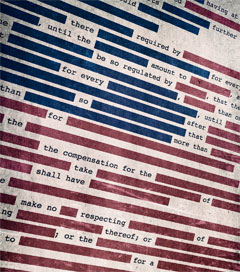UM Being Sued for Allegedly Ignoring State FOIA Response Rules
by Patricia Lesko
The Mackinac Center for Public Policy today filed a lawsuit against the University of Michigan over its delay in providing public records requested under the state’s open records laws.
More than 100 days have passed since Derek Draplin, a reporter for the Mackinac Center’s Michigan Capitol Confidential news service, filed a Freedom of Information Act request for emails sent by University President Mark Schlissel referencing Donald Trump between July 1, 2016 and Nov. 16, when the request was submitted. To date, Draplin has not received the records in question even though the Center’s payments for the documents were cashed and the university said it would only take 2 ¾ hours to fulfill the request.
“This lawsuit should not be necessary,” said Mackinac Center Legal Foundation Director Patrick J. Wright. “This was a simple request. Any of us could find the relevant documents in 30 seconds with a simple word search in our sent email folder. There is no reason it should take over 100 days for the University of Michigan to follow the law.”
The requested emails would provide more insight into an emotionally-charged topic that received much media attention in the immediate aftermath of the election, when President Schlissel made disparaging comments about Donald Trump and those that voted for him. The numerous university-sponsored events held for students upset by the election results caused hundreds of students to speak out against Schlissel and the university’s treatment of students who support the new President.
“In his professional role as head of a public university, President Schlissel took a very public stance against President-Elect Trump and the people who elected him,” said John C. Mozena, Mackinac Center vice president for marketing and communications and publisher of Michigan Capitol Confidential. “Our CapCon team was interested in learning more about the decision-making process that led to the actions taken by this public university and its employee, and filed the FOIA request accordingly.”
In 2011, The Michigan Daily published a Special Report in which the University of Michigan’s student newspaper revealed the university was attempting to charge thousands of dollars for public records that other universities turned over to the newspaper free of charge.
The Michigan Daily reported that its FOIA requests “included information about University employees who use purchasing cards, or PCards, to pay for University-related expenses and information regarding number of parking tickets given each day for one year by the University’s Department of Public safety. The FOIA Office responded that PCard information would cost thousands of dollars — no definitive amount was named — and the parking ticket information would total $1,240. But when the Daily requested similar data from other Big Ten universities, the majority of schools sent the data free of charge.”
When a university charges thousands of dollars to retrieve a public records request, it raises questions about how the school is managing its information, says Frank LoMonte, executive director of the Student Press Law Center — a non-profit that advocates for student journalists’ First Amendment rights.
“When we see these jackpot prices quoted … either the school just doesn’t want the records seeing the light of day, or the school’s record-keeping is a disaster,” LoMonte said.
In 2014, The Michigan Daily revealed that UM, contrary to state law, lacked a policy for preserving public records.
Michigan’s open records law requires a government agency, including public universities like the University of Michigan, to respond to a request within five business days. Relevant dates include:
- The FOIA request was filed Nov. 16.
- On Dec. 12, a university representative informed Draplin it would take 2 ¾ hours of work and cost $126.04 to complete the request.
- The Mackinac Center’s good faith deposit check of $63 was sent Dec. 15 and deposited on Dec. 20.
- The university was closed from Dec. 24 through Jan. 2.
- On Jan. 10, the university said it would provide the records in 14 days, yet nothing was sent by that date.
- On Jan. 27, the university said the documents would be available in 7 to ten days, but again, nothing was sent.
- On Feb. 9, the university informed Draplin that four emails matched his request and asked for the remaining $72.15 in fees.
- On Feb. 22, the university cashed the Mackinac Center’s check required to fulfill the request.
- As of March 1, no documents have been received.
“The university’s delay is so egregious we were forced to turn the matter over to the courts so they could uphold basic principles of government transparency,” Mozena said. “Accountable government requires transparency and effective journalism requires timely transparency. Delayed FOIA responses hurt the ability of journalists and everyday citizens to investigate and publicize the actions of our government.”
The Mackinac Center Legal Foundation filed a similar lawsuit in July against the Michigan Department of Environmental Quality for delaying for months the release of emails related to the Flint water crisis. The Court of Claims recently rejected DEQ’s attempt to have the case dismissed and the case is ongoing.
“To borrow a phrase from the University of Michigan’s football coach, the Mackinac Center will fight for governmental transparency ‘with an enthusiasm unknown to mankind,’” Wright said. “The documents are important, but at this point, it’s really about the delay. People and the press have a right to information no matter how embarrassing or inconvenient it might be to the public officials involved.”
The Center is seeking the records, full penalties available under the law, costs and any other relief the Court deems just due to the university’s willful disregard of Michigan’s transparency laws. The case was filed in the State of Michigan Court of Claims.

